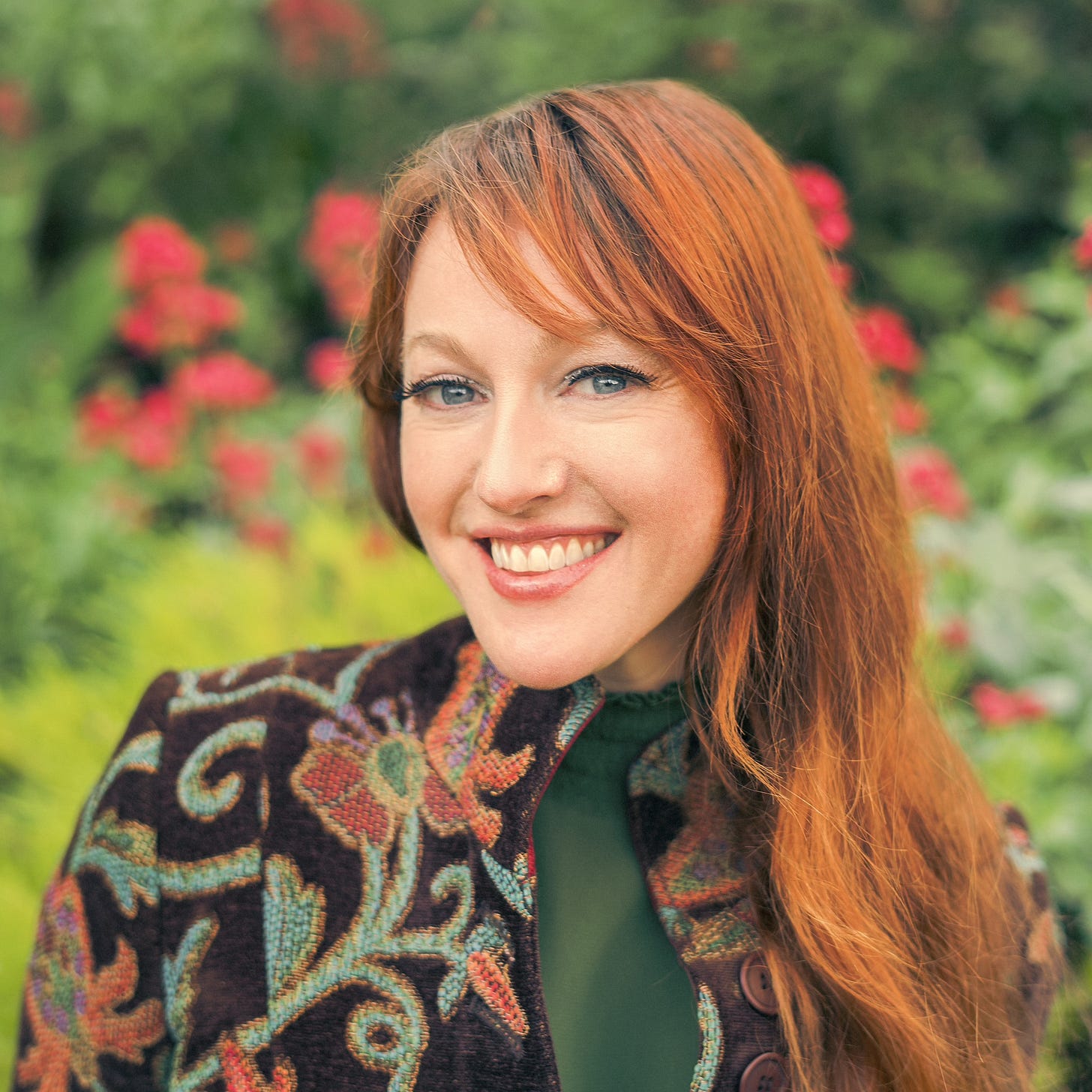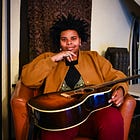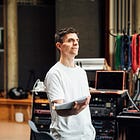CR 052: Multi-Hyphenate Artist Tiff Randol on Tackling Music and Motherhood
The musician and co-founder of the global nonprofit Mamas in Music discusses her career, AI, and her recent AuDHD diagnosis.
Since the start of her career, Tiff Randol has worn many hats—composer, producer, vocalist, filmmaker, and writer, to name a few—earning accolades for her ethereal, Kate Bush-inspired music. Her 2013 song “To Feel Alive” was the theme of the hit film Percy Jackson: Sea of Monsters; her compositions have been featured in numerous films, TV series, and ad campaigns; and her immersive film projects have screened at festivals worldwide.
But in 2018, she found herself in a new, challenging position. She’d just given birth to her son and, with her husband at work and her family on the other side of the country, found herself alone. “About six weeks after I had [my son], my management team went in a different direction,” Randol says. “My husband’s a director, and he was on set. We were in Los Angeles; I’m from the East Coast originally. It felt isolating to be away from family and unsure during this very vulnerable and emotional period of time.”
Like most new moms, Randol searched for mom groups to join but couldn’t find anything for mothers working in music. “I wanted to find something specific to the industry and the stigmas that are so particular to it. I wanted to connect with other mothers in music,” she says. After meeting another new mom, UK singer-songwriter Mary Leay, the two decided to launch Mamas in Music, a global nonprofit that aims to provide resources and community to mothers in the music industry.
Randol says the nonprofit was founded in response to the question, “How do we bring women together around the globe to be able to support each other, create resources, and work towards systemic change?” She adds, “We’ve got chapters in different parts of the globe, and it just keeps growing. We just had a launch in South Africa a couple weeks ago. It’s amazing to meet women around the world and build community. As somebody who’s always longing for that village, it’s been amazing to be a part of building something that didn’t exist, and seeing how it’s actually creating change. There’s other organizations that are cropping up and things that are happening out there. I can see and feel the change happening. We got a long way to go, but it’s in motion.”
Last week, Randol released “Free (Holy Now Remix)” under her artist alter ego, IAMEVE. The track is a new, trance-driven take on her song “Holy Now,” which she wrote about the birth of her son. Over Zoom, we spoke about the remix, her background, her thoughts on AI, and what changes she’d like to see in the music industry.
SANDRA EBEJER: Tell me about your background. Did you grow up in a musical family?
TIFF RANDOL: I did not. I was always drawn to music, and it was a big part of my life. But no, I did not come from a musical family. It was just one of those things that I was always needing to use for my own way of communication and self-expression.
When did you first start playing? What was your entrance into making music?
It was my little Fisher Price record player when I was three. And I was doing classical piano and musical theater when I was really young. I hated studying piano and being forced to do things a certain way. It was not a way that I learned very well, so I threw it aside. Much later, I regretted that. When I came back to music when I was 17 and was like, “I’m gonna go to NYU and do music for a living,” I was like, “God, I wish I would have been forced to hold on to those piano lessons.” [Laughs]
The music you release under your own name is very different from what you release as IAMEVE. Can you talk about these two bodies of work and how your sound has evolved over time?
When I went to NYU for music, I was exploring a lot of sound design and composing and things that were more experimental. And then I started going into a different direction because I didn’t see a viable path for composing and audio engineering. There weren’t really any women examples there, so I decided to focus on songwriting and performing. That just seemed like a more obvious path. Along the way, I continued to experiment with producing and finding my way and playing with a lot of genres. I was in a punk band, and then I was doing singer-songwriter stuff. The singer-songwriter and punk stuff felt more feasible to dip my toes into with producing.
And then I had this huge accident when I moved from New York to Los Angeles in 2010-ish, where I had my left elbow replaced. That was a huge turning point for me, because it was a very long recovery process. The doctor said that I likely wouldn’t be able to [play] any guitar and the piano would be a thing that would take me some time to get to. But in that time, it brought me back to those original roots when I was experimenting with electronic music and more of an experimental approach with sound. I started to use that time while I was recovering to play with things and find different ways to perform and create. And that led to IAMEVE.
Also, during that time, because I was doing so much healing, I was doing a lot of shamanic work and deep dives, personally. It felt like a big transformational point, like the universe slammed me down and was like, “Stop! Time to check in and do a reboot.” So that became IAMEVE, [which] is a very specific project. That’s a place where I can explore the unraveling of the onion, these different layers of archetypes and my own feminine journey from when I started to now, where I’m a mother—all these different pieces of becoming that I’ve played with.
I would also say that [I was] more recently diagnosed with autism and ADHD, so it’s been fun to look back at that project. All these different archetypes and these different roleplays that I was exploring through all of this has been such a piece of my whole existence, how I am shaped in the world and how I fit into the world. So it’s a very spiritual project. And Tiff Randol is really a place where I can do whatever I want. Recently, I’m more focused there, I would say, around composition and scoring and instrumental work, which is a newer venture for me that’s been very exciting.
You just mentioned your autism and ADHD diagnosis. How was it for you to get that news as an adult? Did you feel as though things suddenly made sense?
It’s funny, I always knew I had ADHD. It was never diagnosed, and it was never explained to me along the way. It was mostly one of those [joking] things, “Ah, we’re all ADHD in our family,” you know? But the autism one took me by surprise. When my child was diagnosed, it became something that I started to learn more about. And then I had another Mama in Music in the UK who I was sharing my experience with, and she said to me, “You might want to look into this, because I have a feeling you might be like me—autistic, ADHD, AuDHD.” And I thought, “No, not possible.” I thought I knew what that looked like. And then I started diving down the rabbit hole and I was like, “Oh my God, absolutely everything makes sense to me now.”
There was a lot of grief. There was a lot of recognition. There was a lot of going, “If I would have known this along the way...” It’s everything from why I needed music to express and communicate my feelings and feel safe doing it, to why I quit piano, and my experience in school and in social experiences—all of it. To even, as I mentioned, IAMEVE. I look back at that and I’m like, “Oh, how cool is that to see now what I was doing?”
You just mentioned your son. The song “Holy Now” was influenced by his birth. How has being a mom changed how you approach your work?
Well, it’s made me more honest. It’s taught me to prioritize. I hear this from a lot of other mothers, too. You have to change the way you’re working. You have to work smarter and more focused and prioritize and make sure that the work that you’re doing is what you need to be doing or want to be doing. So it’s made me reassess who I am in the world, what I want to do here, and not try to do something outside of who I am.
What was behind the decision to remix the song, and what was that process like for you?
I’d never done a remix before. I was always really intimidated by that. I had often been like, “I wonder if I can remix? I’m sure I can.” But I’m not one of those people that has an immediate template. I can do that if I’m working on a certain project and it requires it, but it’s not in my nature creatively to do that. I’m more flow focused. For a remix, they’re formulaic. There’s a method to them. And that was intimidating to me. But it was really fun to dive into and just be like, “Let’s see what happens when I do this.”
I really love the way it came out. I mean, I love the original song. It’s a very personal song about my birthing experience and what that felt like to essentially be delivered by my child in the first moment that I held him. Every time I listen to the original song, I’m crying. Every time. It doesn’t matter how long I’ve worked on it, or how many times I’ve heard it, it always makes my eyes well up. So [the remix] is fun, because I can put it on and have fun listening to it without always welling up. [Laughs]
You have a long list of film and TV credits to your name. How does your approach to work change when you’re creating for yourself versus a brand or a series?
When I’m doing something for myself, I don’t have any set rules. I don’t have timelines and things like that. Like, I’m about to be releasing a song a month, and some of them I’ve been working on for a long time. I started them during one moment of life, and then I put them down because of motherhood or different things happening and came back to them. There’s a freedom in that process to not have a hard deadline. And they’ve been through many incarnations, so it’s fun to see how they’ve carved out. When I’m working on a project for a brand or a director, it’s a totally different muscle. It’s actually really fun to have a directive. I consider it a learning process. So it’s interesting to put on that hat and go, “How do I bring my unique voice to this?”
Who are some of your influences? Who or what do you turn to for inspiration?
I have a lot of influences. Depends on my mood and mode. I am always a fan of the classics—Kate Bush, Peter Gabriel, David Bowie, Simon & Garfunkel. And then I also have a lot of composer influences. I love Max Richter, Thomas Newman, Ólafur Arnalds. Right now I have a lot of Ólafur Arnalds and Max Richter on repeat.
Do you ever face creative blocks? How do you break through them?
Yes! [Laughs] Working with other people is the best way to break out of them. One of the things that I’ve been doing that’s been a game changer for me creatively—I will give a nod to a company called Musiversal. They do a subscription with musicians and for me, that’s been a game changer, because I can book sessions consistently. You can book four sessions at a time. So when I run out of a session, then I’m booking another one. It forces me to keep moving and keep chugging things out. It’s been wonderful to have that accountability. I think that’s a big thing, especially with people who have ADHD, to be able to have that accountability partner, whatever that looks like, whether it’s something like Musiversal or a writing partner. Those kinds of things, deadlines and partners, make all the difference for getting through those blocks.
You’ve worked with various forms of media, including virtual reality. AI is becoming more and more a part of our lives, for better or worse. As an artist, what are your thoughts on AI?
Well, when I listen to episodes of Ezra Klein [podcast], I’m very concerned. [Laughs] It’s hard to say, because you look at the history of whenever there’s been major change and there’s always been these conversations of edging humans out for technology. To some degree that happens, but also hasn’t, so far, been as bad as we anticipated. So I’m clinging to the hope that we’ll find ways to control and govern the situation responsibly. But we’re in a very strange time, so I feel all the anxiety, as well. I do think there’s areas where it’s helpful. Again, bringing up the neurodivergence, sometimes it’s helpful to be able to have immediate feedback around something, even something therapeutic. Like, “I would love feedback on this situation that I’m grappling with in my mind. Normally, my brain would be cycling continuously, because it’s just designed that way until I solve it.” Sometimes that can help me put the pause button on it, to be like, “How do I get myself out of a cycle?”
I don’t know. I’m making a case for AI right now in this scenario, which is not great, but also to say that there’s places where I definitely find it helpful and grounding for my system at times to work things out. But I think we have to, as a society, figure out how to be responsible for it, because it’s obviously really freaking scary what it makes available for people in the world. And also [ensure] that it’s not stealing from people in these ways that it currently is. It’s one thing to be inspired by and have some tools to assist, and it’s another thing to press a button and be like, “Hey, I did this thing.”
What advice would you offer to those who aspire to work in music?
You better really want it. [Laughs] You better really need it. By the time this article comes out, it could be a completely different industry. It’s so fast moving. The minute you think you understand one thing, it’s already changing. It’s a wild ride. I was on a call the other day and there were some amazing women on there. It was around mentorship and the women on that call were talking about how they had these amazing women mentors along the way. And I thought, “I wish I would have had that. What would that have changed for me?” I didn’t even know that was available. So I would say to find a mentor. That would provide so much along the way.
As a working mother, musician, and co-founder of Mamas in Music, what changes would you like to see in the music industry?
Good question. I’d like to see unions, for starters—ways to actually create support for freelancers. That’s a very long and winding road. There’s the end goal, which is big system changes that allow support for creators and women in the workplace. But then there’s more doable, short-term goals, like collaboration [between] Mamas in Music and other organizations, micro-grants, childcare stipends, and more flexible work environments [where] people can get work done without being on a specific schedule that’s the same as somebody who doesn’t have those same responsibilities.
Also, a lot of it is stigma-based, like changing the tone. I mean, talking about motherhood has been something that’s been fairly invisible until more recently in music. People felt the need to be silent about it or talk down about it. I’d love to see a future where young women can balance both. I hope with Mamas in Music, it becomes something where—because of this collective working together to create resources and community—there’s women out there that go, “There’s a lot of cool opportunities in music when you become a mother.”
To learn more about Tiff Ranol, visit her website.
This interview has been edited for clarity and length.
You might also enjoy…








